Electrical Engineering
- SarkariResult

- Jun 14, 2023
- 3 min read
**Electrical Engineering:**
Electrical engineering is a field of engineering that deals with the study, design, development, and maintenance of electrical systems, electronics, and technologies. Electrical engineers work on a wide range of projects related to power generation, communication systems, electronics, control systems, and more.
**Key Aspects of Electrical Engineering:**
1. **Power Systems:** Electrical engineers design and manage power generation, transmission, and distribution systems. They ensure the efficient and safe supply of electricity to homes, industries, and commercial establishments.
2. **Electronics:** This area focuses on the design and development of electronic circuits, devices, and components. Electrical engineers work on technologies such as microprocessors, integrated circuits, and sensors.
3. **Control Systems:** Electrical engineers design control systems that regulate the behavior of machines and processes. These systems are essential for automation in industries and robotics.
4. **Communication Systems:** Electrical engineers work on designing communication systems such as wireless networks, satellite systems, and telecommunications infrastructure.
5. **Renewable Energy:** Engineers in this field focus on sustainable energy solutions, including solar power, wind energy, and energy storage technologies.
6. **Signal Processing:** Signal processing involves analyzing and manipulating signals to extract useful information. Electrical engineers work on applications such as audio and image processing.
7. **Electrical Machines:** Engineers design and analyze electrical machines like generators, motors, and transformers used in various industries.
8. **Power Electronics:** This field deals with converting and controlling electrical power efficiently. Electrical engineers work on devices like inverters and converters.
**Career Opportunities:**
Electrical engineers have a wide range of career options in sectors such as:
- Power Generation and Distribution
- Electronics and Telecommunications
- Renewable Energy
- Control Systems and Automation
- Consumer Electronics
- Aerospace and Defense
- Semiconductor Industry
- Research and Development
**Education:**
To become an electrical engineer, individuals typically need a bachelor's degree in electrical engineering or a related field. Advanced degrees may be required for specialized roles or research positions.
**Skills:**
Electrical engineers need strong analytical, problem-solving, and technical skills. They also work with software tools for circuit design, simulation, and analysis.
**Languages:**
In Marathi, "Electrical Engineering" can be translated as "विद्युत अभियांत्रिकी."
Electrical EngineeringCertainly, here's some information on the topics you've asked about:
**Electrical Engineering Salary:**
The salary of an electrical engineer can vary based on factors such as experience, location, industry, and specialization. in the United States, the average salary for an electrical engineer ranged from around $70,000 to over $110,000 per year.
**Electrical Engineering Salary in Pune:**
In Pune, India, the salary of an electrical engineer can vary based on factors like experience, skills, and the industry they work in. the average salary for an electrical engineer in Pune could range from around INR 3 to 8 lakhs per annum or more.
**Electrical Engineering Jobs:**
Electrical engineers can work in various industries, including power generation, electronics, telecommunications, automation, and more. They can hold positions such as design engineer, project manager, systems engineer, control engineer, and more.
**Electrical Engineering Subjects:**
Electrical engineering programs typically cover subjects such as:
- Circuit Analysis
- Electromagnetic Fields
- Power Systems
- Electronics
- Control Systems
- Digital Signal Processing
- Microprocessors and Microcontrollers
- Communication Systems
- Power Electronics
- Electrical Machines
- Renewable Energy
- Instrumentation and Measurement
**Electrical Engineering Colleges in Mumbai and Pune:**
Both Mumbai and Pune have several well-known colleges and institutions offering electrical engineering programs. Some of them include the Indian Institute of Technology Bombay (IIT Bombay), Veermata Jijabai Technological Institute (VJTI), College of Engineering Pune (COEP), and more.
**Electrical Engineering Syllabus:**
The syllabus for electrical engineering programs covers various subjects related to electrical systems, electronics, power, and communication. It includes both theoretical and practical aspects of the field.
**Electrical Engineering Subjects in the 1st Year:**
In the first year of an electrical engineering program, students usually study foundational subjects such as mathematics, physics, chemistry, engineering drawing, and basic engineering principles.
**Electrical Engineering Interview Questions:**
Interview questions for electrical engineering positions can cover topics like circuit analysis, electronics, control systems, power systems, programming languages, and problem-solving skills. Sample questions might include discussing a project you've worked on, explaining a complex circuit, or solving technical problems.



Comments